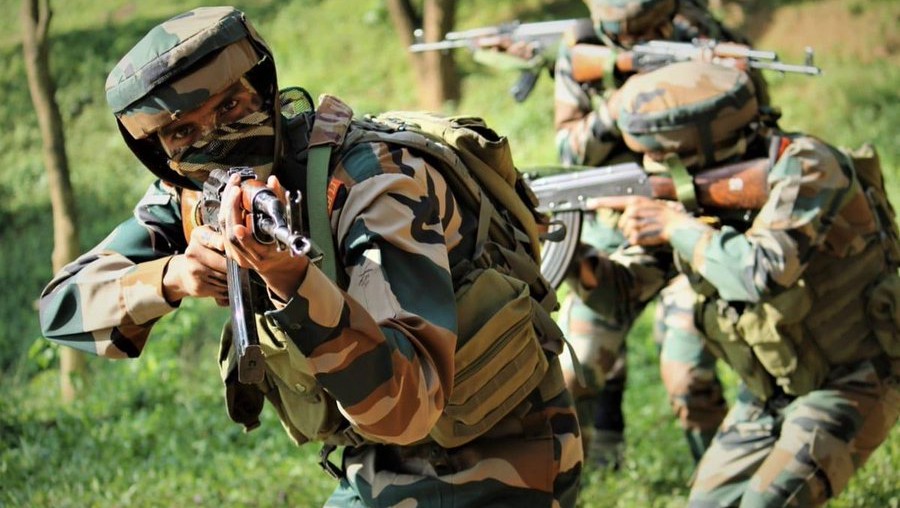
The Pakistani Army on Thursday opened fire at some places along the (LoC) in Jammu and Kashmir, days after 26 people, mostly non-Muslim tourists, were killed in a terror attack in the popular destination of Pahalgam.
The Indian security forces “effectively responded” to the Pakistan Army, sources told Indian news channel NDTV.
No casualty was reported.
“There were incidents of small arms firing at some places along the LoC initiated by Pakistan last night. The firing was effectively responded to,” sources said.
India, Pakistan crisis
Tension between the two nuclear-armed neighbours has increased after the Pahalgam terror attack, an incident that triggered worldwide condemnation.
India announces strict measures
India on Thursday formally informed Pakistan about its decision to suspend the Indus Waters Treaty, which will come into effect immediately in the wake of the Pahalgam terrorist attack.
The letter came shortly after Islamabad’s tit-for-tat move against New Delhi’s diplomatic actions following the Pahalgam massacre.
Islamabad has threatened to suspend all agreements between the two countries, including the Simla Pact of 1972, which validates the Line of Control in Jammu and Kashmir and Ladakh, media reports said.
The Indian Government on Wednesday evening suspended the decades-old Indus Waters Treaty with Pakistan indefinitely as a part of some strict measures taken against Islamabad over the “cross-border linkages” that emerged during the investigation into the Pahalgam terror attack.
Pakistan also announced that it will reduce the Indian diplomatic staff at the High Commission.
In a letter sent this evening, the letter from the Union Ministry of Water Resources to Syed Ali Murtuza, Secretary in the Ministry of Water Resources of Pakistan, said, “The obligation to honour a treaty in good faith is fundamental to a treaty. However, what we have seen instead is sustained cross border terrorism by Pakistan targeting the Indian Union Territory of Jammu and Kashmir.”
The letter also mentioned that Pakistan has consistently ignored India’s efforts to work out certain issues that have cropped up with “fundamental changes in the circumstances that have taken place since the Treaty was executed”.
“These changes include significantly altered population demographics, the need to accelerate the development of clean energy and other changes in the assumptions underlying the sharing of waters under the Treaty,” the letter read.
India said in addition, consistent cross-border terrorism has given rise to ‘uncertainties’ that have “directly impeded India’s full utilization of its rights under the Treaty”.
“Furthermore, apart from other breaches committed by it, Pakistan has refused to respond to India’s request to enter into negotiations as envisaged under the Treaty and is thus in breach of the Treaty,” the letter read.
India has also asked all Pakistani nationals to leave the country by April 29 and suspended all visas, including medical ones and permits given to diplomats under the SAARC scheme.
In a tit-for-tat move, Pakistan also announced that it will reduce the Indian diplomatic staff at the High Commission to 30 persons.
Following India’s decision to suspend the Indus Waters Treaty, Pakistan said, “Any attempt to stop or divert the flow of water belonging to Pakistan as per the Indus Waters Treaty, and the usurpation of the rights of lower riparian will be considered as an Act of War and responded with full force across the complete spectrum of national power.”
Pakistan now faces a grave situation after the water supply from the Indus River and its distributaries, including the Jhelum, Chenab, Ravi, Beas, and Satluj, has been stopped.
These rivers supply Pakistan with water, impacting tens of millions of people in the neighbouring country.
The Indus Waters Treaty was signed between India and Pakistan on September 19, 1960, with the World Bank brokering the agreement. That treaty remained steady despite the three wars between India and Pakistan – in 1965, 1971, and 1999, but is now suspended indefinitely.
Pahalgam attack
The picturesque Baisaran meadow, which attracts thousands of tourists every year, echoed with the sounds of guns and the wails of victims on Tuesday afternoon when terrorists, who were apparently in camouflage, gunned down 26 people.
According to reports, terrorists asked the victims to chant Islamic verses and even pulled down their pants to check circumcision in a bid to confirm their Hindu identities and then opened fire on them.
A Nepali national was also killed in the attack.


